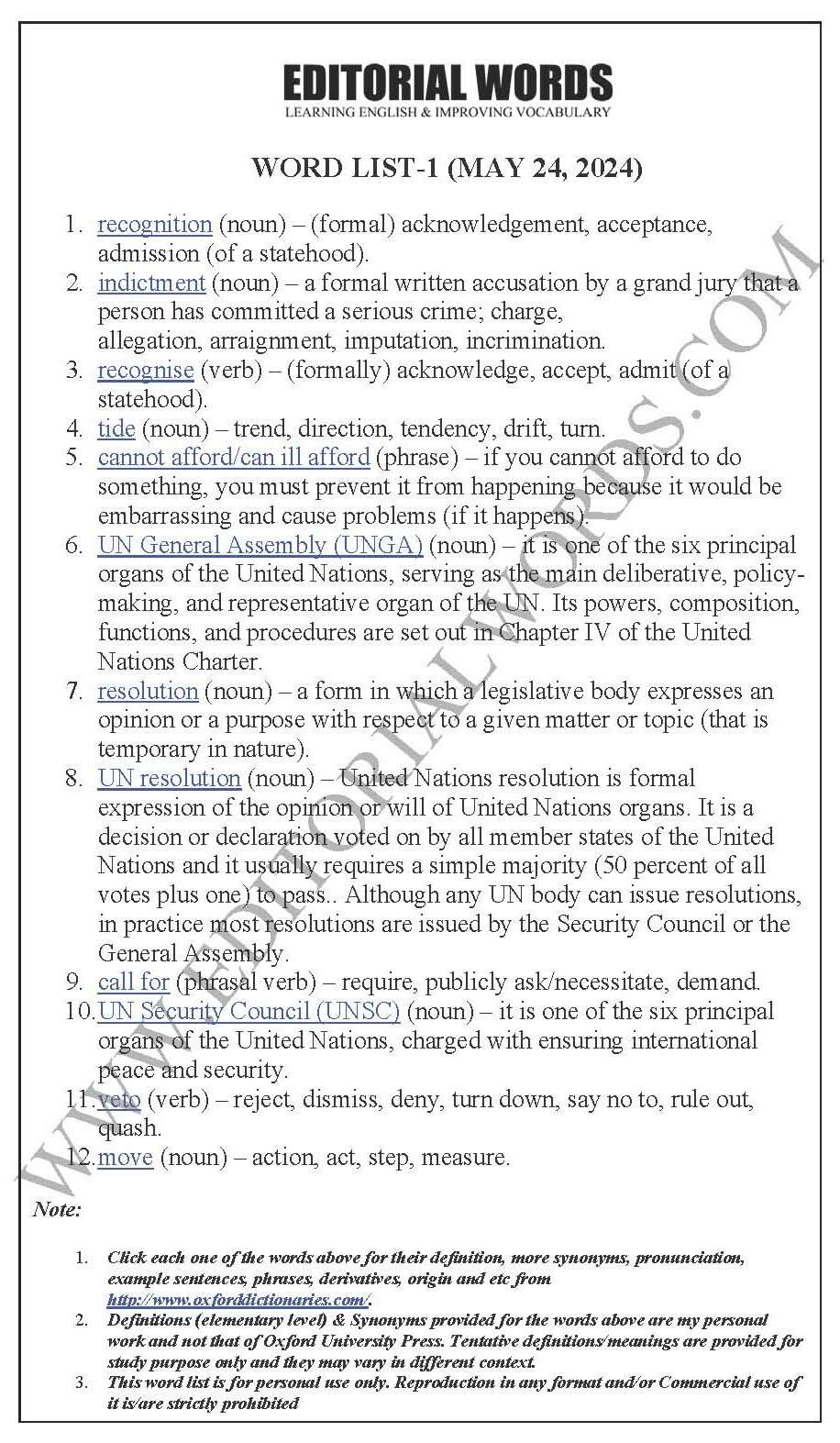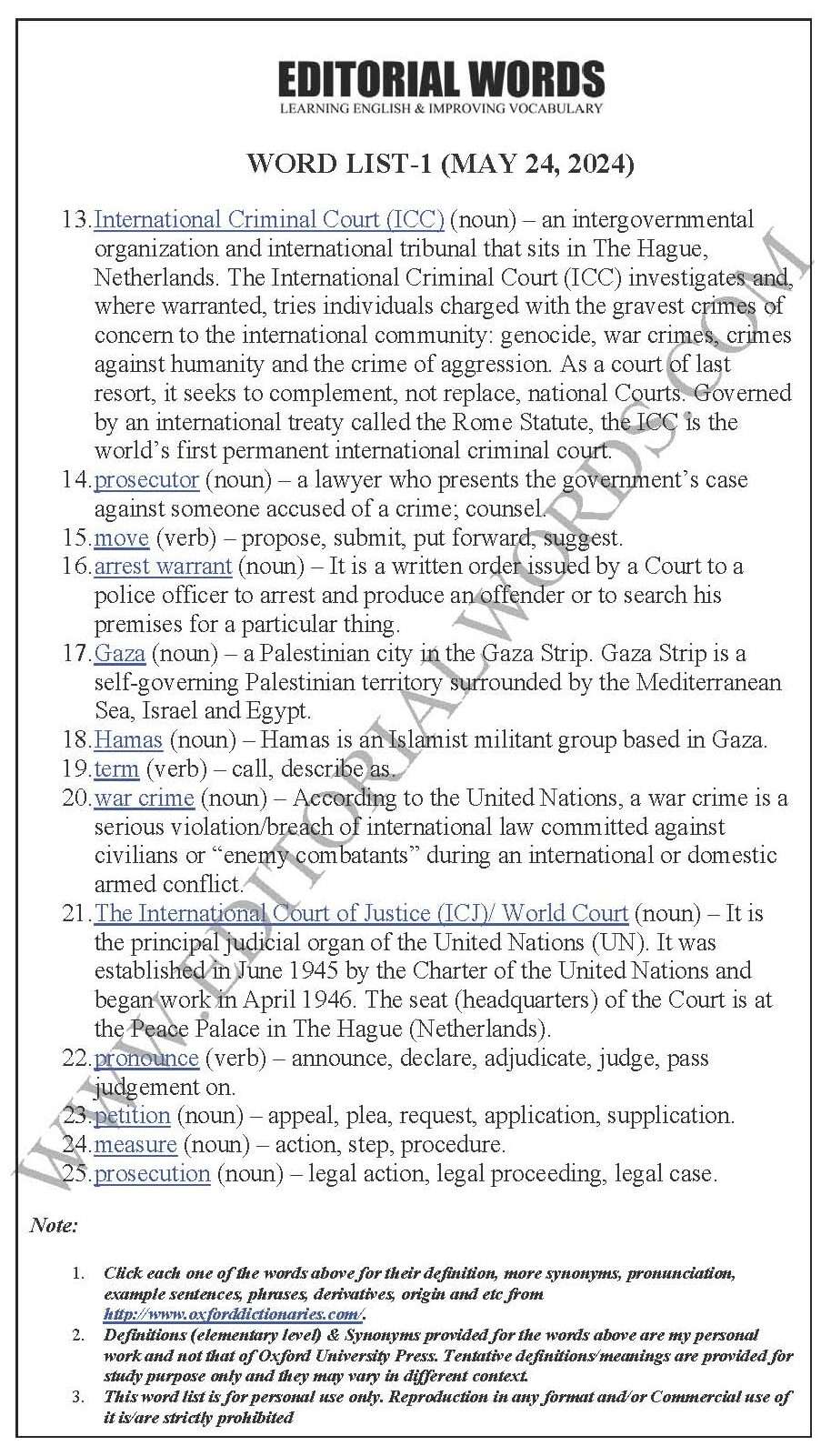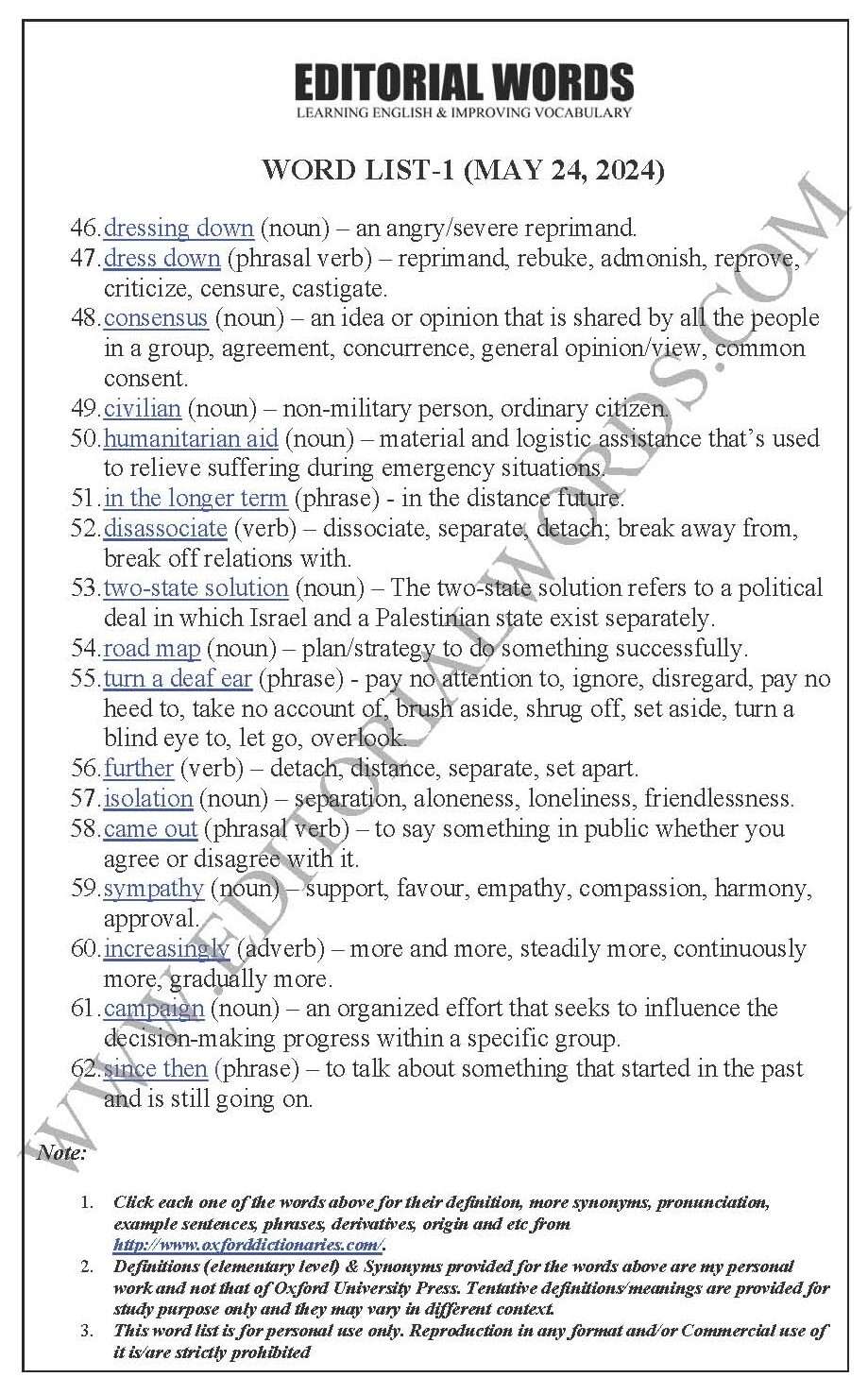The Hindu Editorial (Powerful symbolic value) – May 24, 2024
To read this article, click “The Hindu”.
This preview is provided here with permission.
Courtesy: The Hindu
The Hindu Editorial (Powerful symbolic value) – May 24, 2024:
- recognition (noun) – (formal) acknowledgement, acceptance, admission (of a statehood).
- indictment (noun) – a formal written accusation by a grand jury that a person has committed a serious crime; charge, allegation, arraignment, imputation, incrimination.
- recognise (verb) – (formally) acknowledge, accept, admit (of a statehood).
- tide (noun) – trend, direction, tendency, drift, turn.
- cannot afford/can ill afford (phrase) – if you cannot afford to do something, you must prevent it from happening because it would be embarrassing and cause problems (if it happens).
- UN General Assembly (UNGA) (noun) – it is one of the six principal organs of the United Nations, serving as the main deliberative, policy-making, and representative organ of the UN. Its powers, composition, functions, and procedures are set out in Chapter IV of the United Nations Charter.
- resolution (noun) – a form in which a legislative body expresses an opinion or a purpose with respect to a given matter or topic (that is temporary in nature).
- UN resolution (noun) – United Nations resolution is formal expression of the opinion or will of United Nations organs. It is a decision or declaration voted on by all member states of the United Nations and it usually requires a simple majority (50 percent of all votes plus one) to pass.. Although any UN body can issue resolutions, in practice most resolutions are issued by the Security Council or the General Assembly.
- call for (phrasal verb) – require, publicly ask/necessitate, demand.
- UN Security Council (UNSC) (noun) – it is one of the six principal organs of the United Nations, charged with ensuring international peace and security.
- veto (verb) – reject, dismiss, deny, turn down, say no to, rule out, quash.
- move (noun) – action, act, step, measure.
- International Criminal Court (ICC) (noun) – an intergovernmental organization and international tribunal that sits in The Hague, Netherlands. The International Criminal Court (ICC) investigates and, where warranted, tries individuals charged with the gravest crimes of concern to the international community: genocide, war crimes, crimes against humanity and the crime of aggression. As a court of last resort, it seeks to complement, not replace, national Courts. Governed by an international treaty called the Rome Statute, the ICC is the world’s first permanent international criminal court.
- prosecutor (noun) – a lawyer who presents the government’s case against someone accused of a crime; counsel.
- move (verb) – propose, submit, put forward, suggest.
- arrest warrant (noun) – It is a written order issued by a Court to a police officer to arrest and produce an offender or to search his premises for a particular thing.
- Gaza (noun) – a Palestinian city in the Gaza Strip. Gaza Strip is a self-governing Palestinian territory surrounded by the Mediterranean Sea, Israel and Egypt.
- Hamas (noun) – Hamas is an Islamist militant group based in Gaza.
- term (verb) – call, describe as.
- war crime (noun) – According to the United Nations, a war crime is a serious violation/breach of international law committed against civilians or “enemy combatants” during an international or domestic armed conflict.
- The International Court of Justice (ICJ)/ World Court (noun) – It is the principal judicial organ of the United Nations (UN). It was established in June 1945 by the Charter of the United Nations and began work in April 1946. The seat (headquarters) of the Court is at the Peace Palace in The Hague (Netherlands).
- pronounce (verb) – announce, declare, adjudicate, judge, pass judgement on.
- petition (noun) – appeal, plea, request, application, supplication.
- measure (noun) – action, step, procedure.
- prosecution (noun) – legal action, legal proceeding, legal case.
- genocide (noun) – mass murder, massacre, racial killing.
- vocal (adjective) – vociferous, outspoken, forthright; relating to someone who expresses his/her views frankly.
- statehood (noun) – the condition of being an independent country.
- materially (adverb) – fundamentally, seriously, considerably, substantially; importantly, significantly, considerably, noticeably, palpably, markedly.
- on the ground (phrase) – in a situation/place where things are happening really/practically.
- assault (noun) – attack.
- Rafah (noun) – a Palestinian city in the southern Gaza Strip.
- condemn (verb) – denounce, criticize, censure, castigate, hit out at, discredit, find fault with, slam.
- legitimate (adjective) – legal, lawful, authorized, justifiable, reasonable, acceptable.
- West Bank (noun) – It is a large amount of land located on the west bank of the River Jordan and bounded by Israel to the north, west, & south and by Jordan to its east. The West Bank has been occupied by Israel since the 1967 Middle East war. It’s home to nearly three million Palestinians, and would make up the heart of any Palestinian state.
- moderate (adjective) – non-radical, dispassionate, impartial.
- force (noun) – group, outfit, unit.
- retreating (adjective) – withdrawing, fleeing, pulling out, recoiling.
- front (noun) – a particular situation.
- protracted (adjective) – lengthy, extended, continued, persistent, everlasting, prolonged, unending, unrelenting.
- conflict (noun) – war, warfare, armed conflict, military action, armed clash.
- facility (noun) – place, location, centre.
- meant for someone (phrase) – perfectly suited/appropriate for (someone).
- envoy (noun) – ambassador, diplomat, emissary/consul.
- summon (verb) – order someone to be present; call for, ask for, request the presence of.
- dressing down (noun) – an angry/severe reprimand.
- dress down (phrasal verb) – reprimand, rebuke, admonish, reprove, criticize, censure, castigate.
- consensus (noun) – an idea or opinion that is shared by all the people in a group, agreement, concurrence, general opinion/view, common consent.
- civilian (noun) – non-military person, ordinary citizen.
- humanitarian aid (noun) – material and logistic assistance that’s used to relieve suffering during emergency situations.
- in the longer term (phrase) – in the distance future.
- disassociate (verb) – dissociate, separate, detach; break away from, break off relations with.
- two-state solution (noun) – The two-state solution refers to a political deal in which Israel and a Palestinian state exist separately.
- road map (noun) – plan/strategy to do something successfully.
- turn a deaf ear (phrase) – pay no attention to, ignore, disregard, pay no heed to, take no account of, brush aside, shrug off, set aside, turn a blind eye to, let go, overlook.
- further (verb) – detach, distance, separate, set apart.
- isolation (noun) – separation, aloneness, loneliness, friendlessness.
- came out (phrasal verb) – to say something in public whether you agree or disagree with it.
- sympathy (noun) – support, favour, empathy, compassion, harmony, approval.
- increasingly (adverb) – more and more, steadily more, continuously more, gradually more.
- campaign (noun) – an organized effort that seeks to influence the decision-making progress within a specific group.
- since then (phrase) – to talk about something that started in the past and is still going on.
Note :
1. Click each one of the words above for their definition, more synonyms, pronunciation, example sentences, phrases, derivatives, origin and etc. from http://www.oxforddictionaries.com/.
2. Definitions (elementary level) & Synonyms provided for the words above are my personal work and not that of Oxford University Press. Tentative definitions/meanings are provided for study purposes only and they may vary in a different context.
3. This word list is for personal use only. Reproduction in any format and/or Commercial use of it is/are strictly prohibited.
The Hindu Editorial (Powerful symbolic value) – May 24, 2024:




“Phrasal Verbs” We Learnt Last Week
“Idioms & Phrases” We Learnt Last Week
“Important Definitions” We Learnt Last Week
Recent Word Lists For The Hindu Editorial Articles

The announcement by Ireland, Norway, and Spain, of their intent to formally recognise the state of Palestine, next week, is one more important sign of the changing tide of international opinion that,… For further reading, visit “The Hindu”. Below is today’s word list-1 for The Hindu Editorial (Powerful symbolic value) – May 24, 2024.